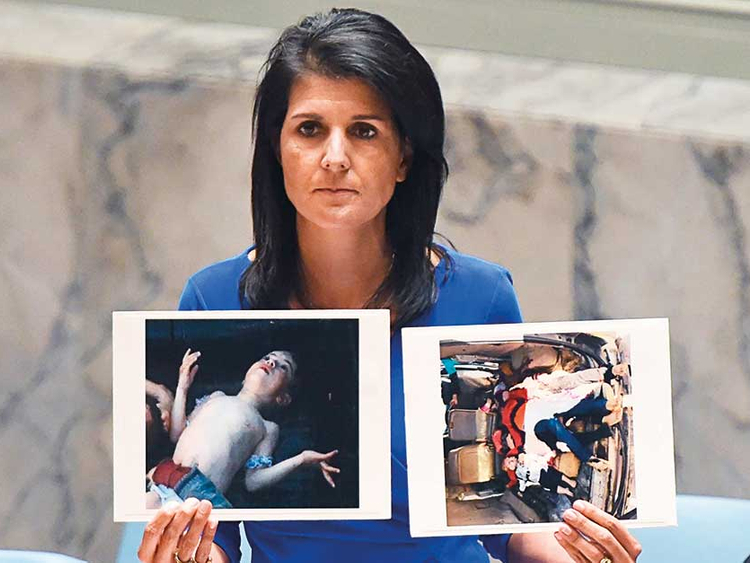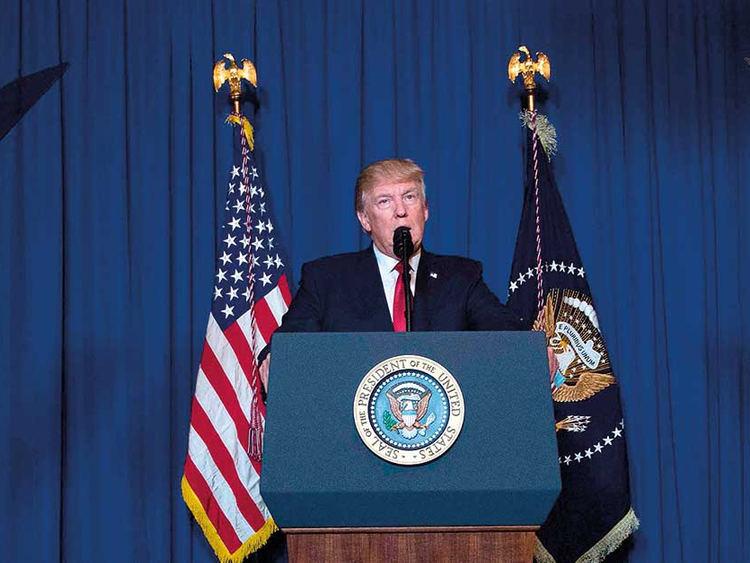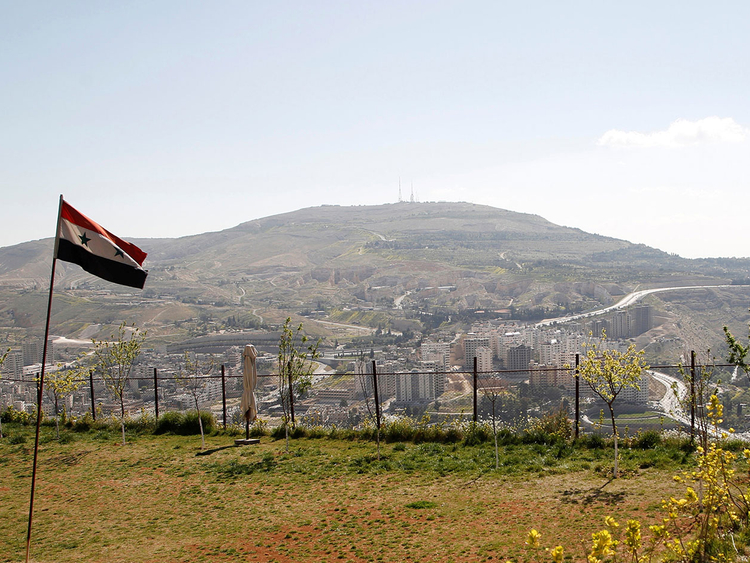
PALM BEACH, Florida: President Donald Trump’s sudden decision to order airstrikes against the Syrian government was an overnight evolution for a president who long warned against deeper American involvement in one of the world’s most stubbornly violent conflicts.
As he soberly announced the assault Thursday night, Trump argued that the move was still within the framework of his “America First” foreign policy agenda.
The United States, he said, has a "vital national security interest" in stopping the proliferation of the kinds of chemical weapons the Syrian government used against its citizens earlier this week.
Yet Trump’s actions left no doubt that — at least in this instance — his view of America's role in the world has been altered.
Trump is hardly the first president to reconsider his views after assuming the responsibility of controlling the world’s most powerful military.
Abdul Hamid Al Yousuf carries his twin babies who were killed during the toxic gas attack in Khan Shaikhoun. AP
READ MORE:
Father buries 22 family members after Syria gas attack
World reacts to US missile strikes on Syria airfield
But with a major shift coming just 77 days into his presidency, his may be one of the fastest transformations in recent memory.
After spending years warning US leaders that Syria was a dangerous quagmire, Trump is said to have been moved by the gripping images of young Syrian children's listless bodies that were beamed across the world following the chemical attack.
Beautiful babies
He mourned the "beautiful babies" were among the dozens killed by the deadly gases and accused Syrian President Bashar Assad of having "choked" his own citizens.
His sentiment — the United States’ “responsibility to protect” — echoed those often used by some Trump's ardent detractors.
That doctrine, espoused most notably by President Barack Obama's former ambassador to the United Nations Samantha Power, holds that world powers have an obligation to defend civilians from conflict, particularly from their own governments.
Different vision
Trump campaigned on a wholly different vision for the nation's foreign policy, one that bordered on isolationism and centered on recalibrating trade deals with international partners. He has specifically said the Middle East is one region of the world he hoped to avoid.
Yet in the short term, Trump's decision to plunge the U.S. deeper into the Syria conflict won him plaudits from his own party. Even some Democrats were muted in their response, a signal of how frustration with US inaction in Syria has permeated both parties.
"The question now is what the consequences and reactions will be, and what are the president's strategic and long-range goals and plans with respect to US involvement in Syria," said Sen. Jack Reed, D-Rhode Island, the top Democrat on the Armed Services Committee.
Trump's decision was all the more remarkable for his strident public opposition to launching a strike on Syria when the decision weighed on his predecessor.
Trump on Twitter against Obama action on Syria
In September 2013, Trump repeatedly took to Twitter to urge Obama to not to attack Syria after another chemical weapons attack.
What will we get for bombing Syria besides more debt and a possible long term conflict? Obama needs Congressional approval.— Donald J. Trump (@realDonaldTrump) August 29, 2013
"AGAIN, TO OUR VERY FOOLISH LEADER, DO NOT ATTACK SYRIA — IF YOU DO, MANY VERY BAD THINGS WILL HAPPEN & FROM THAT FIGHT THE U.S. GETS NOTHING!," he wrote.
He followed two days later with another tweet declaring, "There is no upside and tremendous downside" to an attack.
Obama nearly ordered strikes, but ultimately pulled back. He called for a vote in Congress that never came, then rallied behind a Russian-backed plan to remove Syria's chemical weapons stockpiles - an agreement that appeared to have failed, given this most recent attack.
Though Trump castigated Obama for appearing weak and indecisive, he maintained as a candidate that Syria was a morass the US should avoid.
As recently as a week ago, Trump's top diplomats, Secretary of State Rex Tillerson and UN Ambassador Nikki Haley, both indicated the US might take a hands-off approach to a civil war that has killed hundreds of thousands of people and forced millions more from their homes.
Uncertain
The long-term implications of Trump's sudden policy shift are deeply uncertain. But his supporters seemed willing to accept his decision.
"President Trump has tonight more than earned a second or third look from a lot of doubters — both at home and abroad," said Kevin Kellems, a Republican strategist who briefly worked on Trump's campaign and also advised former Vice President Dick Cheney.
Kellems singled out in particular "the speed and precision of the decision to strike."
In addition to the blunt message sent to Assad, the strikes are also a signal to Russia and Iran, Syria's main benefactors, as well as China, which the U.S. believes isn't doing enough to stop North Korea's nuclear pursuits. Trump ordered the attack while hosting Chinese President Xi Jinping at his Mar-a-Lago resort in Florida amid an ongoing struggle between Washington and Beijing over how to rein in Pyongyang's nuclear weapons and ballistic missile programs.
"This clearly indicates the president is willing to take decisive action when called for," Tillerson said.
Trump's syria strike: Not-so-subtle warning to US rivals
President Donald Trump's decision to strike Syria sent a powerful message around the world — one that could be read very differently in Moscow, Pyongyang and Beijing.
For Russia, it may finally put to rest expectations from the 2016 campaign that Trump will pursue closer ties with President Vladimir Putin, an ally of Syrian President Bashar Al-Assad.
For North Korea, it was a warning the US is willing to act unilaterally.
Trump unpredictable?
And for China, whose leader Xi Jinping was dining with Trump right before the missiles took flight, the attack was a potent sign of the new American president's unpredictability.
The US cruise missile strike, in response to a Syrian chemical weapons attack on April 4 that killed more than 70 people, also showed a president who will dramatically shift his policies in response to changing world events. In 2013, Trump slammed his predecessor, Barack Obama, for considering military action against Syria after a poison gas attack killed more than 1,000 people near Damascus, tweeting "Do NOT attack Syria,fix U.S.A.."
"This gets us back on the track to restoring American credibility," Andrew Tabler, a fellow at the Washington Institute for Near East Policy, said in an interview. "That's why this is more than about just Syria. It's about nonproliferation. It's about a lot of things."
Putin on Notice
One of them is putting Putin on notice that the US will no longer tolerate his close ties to Assad. Russia has sent troops and weapons to Syria to aid Assad's battle against rebels seeking his ouster.
In a sign of how little trust there is between the US and Russia, Secretary of State Rex Tillerson said the US didn't consult with Moscow before the strikes. Instead, it used an established military "deconfliction" channel to inform Russia that an attack would soon be under way.
"There were no discussions or prior contacts, nor have there been any since the attack, with Moscow," Tillerson told reporters Thursday night in Florida.
Tillerson, who's due to meet with Putin in Moscow next week, left no doubt about the administration's view of the Russian president's relationship with Assad.
The secretary said Russia bore some responsibility for Syria's use of chemical weapons, calling Moscow either "complicit'' or 'incompetent.''
Russia on Friday denounced the U.S. attack with equally stern language. Putin "regards the strikes as aggression against a sovereign nation," his spokesman Dmitry Peskov said, according to Interfax, noting that the Russian leader believes the strikes were carried out "in violation of international law, and also under an invented pretext."
North Korea
Alongside the overt message to Russia lay an implicit warning to North Korean leader Kim Jong-Un that the U.S. was closely watching his regime's pursuit of nuclear missiles.
It reinforced Trump's remark to the Financial Times in an interview published April 2 that his administration could act on its own to stop North Korea from developing a nuclear weapon if China doesn't do more.
After two decades of failing to rein in Pyongyang's weapons program, the U.S. is concerned that Kim's regime is attempting to build a missile that could deliver a nuclear weapon to North America. Kim has launched dozens of projectiles and conducted three nuclear tests since he came to power after his father's death in 2011. In January, he claimed to be in the final stages of preparations to test-fire an intercontinental ballistic missile.
China has backed North Korea since a war on the peninsula in the 1950s, in part to prevent having a U.S. ally on its border. While Beijing's leaders have enforced some United Nations-backed sanctions on North Korea after a series of nuclear and ballistic missile tests, China accounts for more than 90 percent of its total trade.
New Approach
Trump's attack on Syria is a not-so-subtle way of telling Beijing that it must adopt a new approach to Kim's regime.
"Many Chinese strategic thinkers do believe that the U.S. may initiate a pre-emptive attack against North Korea's nuclear facilities," said Zhang Baohui, director of the Center for Asian Pacific Studies at Lingnan University in Hong Kong. "So there is a possibility that the strike may motivate Xi to do more to help the U.S. on this issue. China does tend to think that war is possible in the Korean Peninsula, which is something they want to avoid at all costs."
Xi's visit with Trump in Florida was supposed to be an opportunity for the two leaders to build a rapport and work through tough issues, especially trade. Instead, their first meeting was disrupted and overshadowed by the assault on Syria.
After Dinner
The cruise missile strike was launched minutes after Xi finished his dinner at Trump's Mar-a-Lago resort, as the two leaders looked ahead to a Friday agenda filled with discussions.
It wasn't just the timing of the attack that put Xi in an awkward spot.
"The Chinese are going to be unhappy with this development because America taking unilateral military action against a country at the moment when the Chinese President is having dinner gives the appearance that China in some way approves of this action," said Dennis Wilder, a former director for Asian issues on President George W. Bush's National Security Council.
The Chinese are very much against the idea of ousting Assad and will not want to look complicit, he said.
"Publicly I think Xi will attempt as best he can to ignore this. He will want to continue act as if nothing has gone on and get the public picture he wants out of this," Wilder said. "I think that the Chinese will be expressing some anger privately to the United States."



















